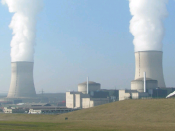Jennifer Jiao 4
Nuclear power: Is It Key to The Energy Future?
The scarcity of the natural resources and the environmental problems get us into a panic. Human beings today are facing the most significant problem and the biggest threaten that the rapid developing society and technology bring to us. However, since the Einstein invented the nuclear power, the worries of using nuclear power never be expunged. Weighing the risks and benefits, the result is obvious: In a comprehensive perspective, nuclear power is our best choice so far.
Pollution
Concern these many years about pollution and CO2 mitigation of the atmosphere and its theoretical greenhouse effect on global temperatures has now grown to involve several kinds of air pollution including to the pollution of PM 2.5; thus, the Nuclear Power seems to be the key to the energy future of the world. Nuclear power is a clean energy source that generates electricity for one in five homes and businesses in the United States without producing or emitting any greenhouse gases, including carbon dioxide.
Professor from the NRDC organization demonstrates that without nuclear power, it would have been even harder to mitigate human-caused climate change and air pollution.ï¼ÂNRDC.orgï¼ This is fundamentally because historical energy production data reveal that if nuclear power never existed, the energy it supplied almost certainly would have been supplied by fossil fuels instead (overwhelmingly coal), which cause much higher air pollution-related mortality and GHG emissions per unit energy produced. Nevertheless, the Professor from Stanford University Environmental Science Department found that nuclear power plants currently generate 73 percent of all carbon-free electricity in America which may cause trillion tons of fossil fuels to produce, and nuclear power prevented an average of 64 gig atones of CO2-equivalent net GHG emissions globally between 1971-2009.(Hason, James E.)
Since the sea...


